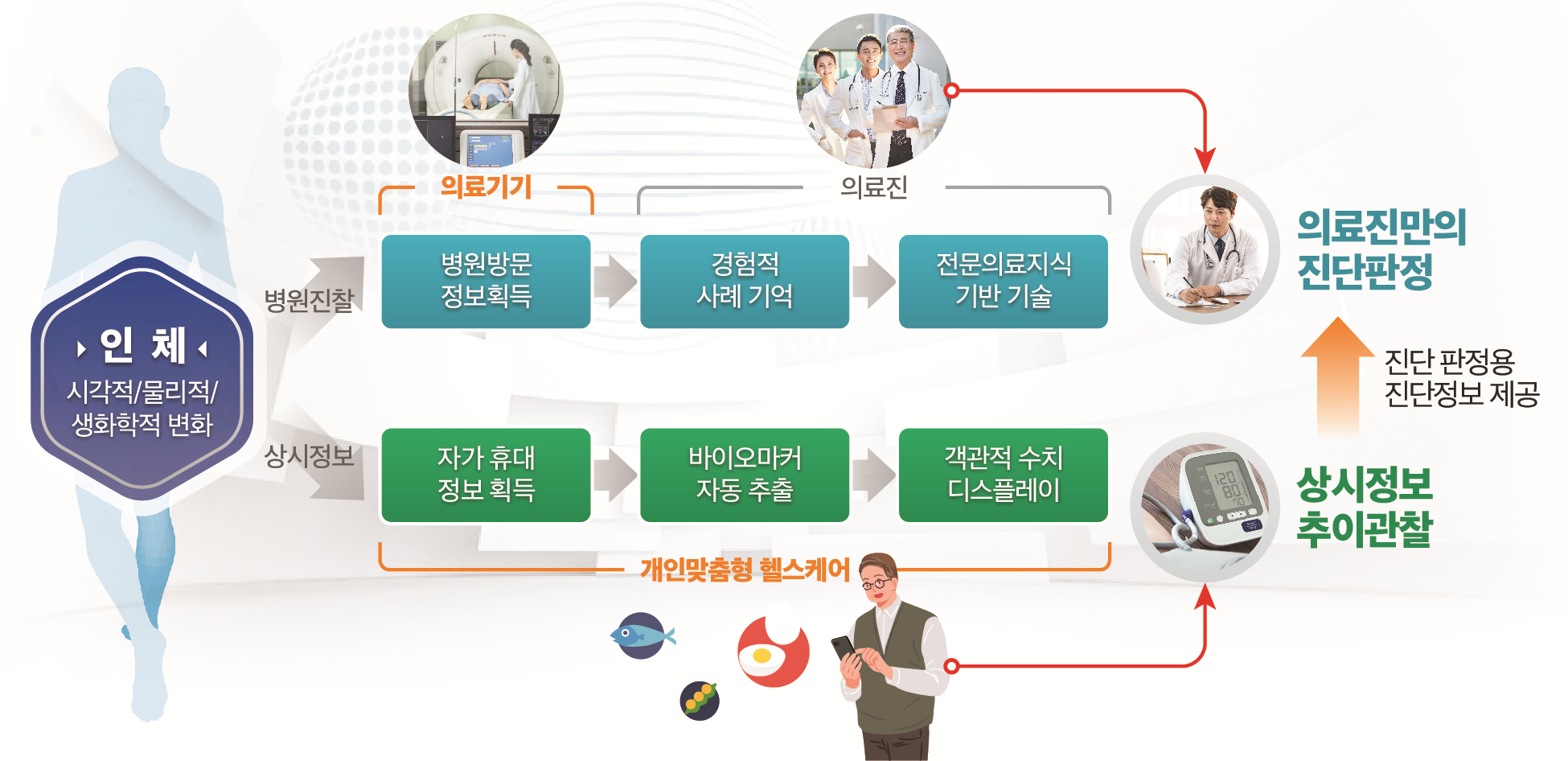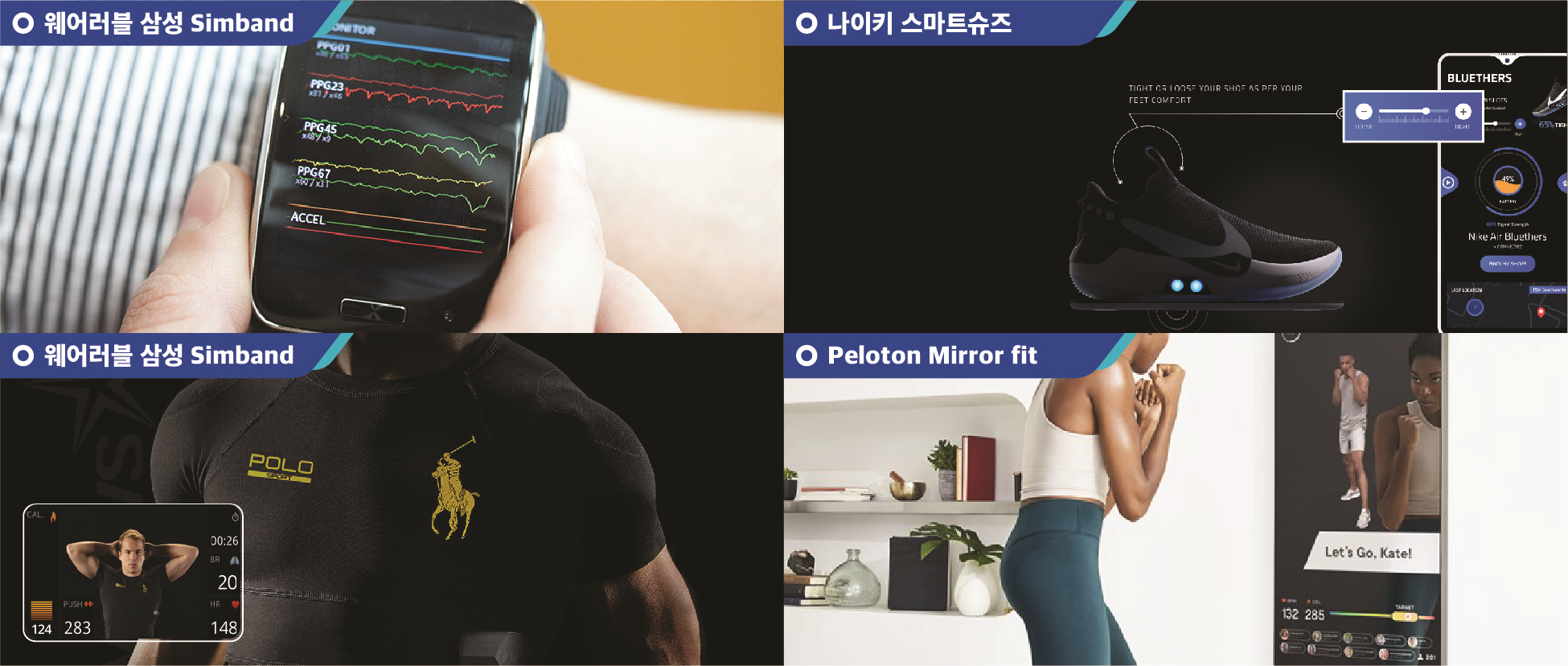Overview of Personalized Healthcare Field
- Personalized healthcare, which involves managing and monitoring individual health and integrating it with the healthcare system, is currently one of the most prominent and highly regarded emerging industries, both domestically and internationally. Especially in the midst of the global COVID-19 pandemic, there is an urgent need for the development of personalized healthcare technologies that enable self-diagnosis of various diseases and viruses and real-time health analysis. Training advanced professionals, including those with advanced degrees (master's and doctoral levels), is crucial for developing personalized healthcare technologies and is a key element for leading global technological advancements.
- Moving away from the era of developing and producing medical products, the focus has shifted to advanced technological developments for the advancement of medical platforms. It is anticipated that future demands will require sophisticated medical platforms that provide comprehensive medical solutions using technologies such as artificial intelligence.
- While traditional medical products were mainly used by medical professionals for diagnostic records and physical assistance in treatment, the current situation calls for extensive technological advancements in the advanced medical industry. In the future, integrating this with artificial intelligence technology will expand the scope to include personalized smart healthcare, which not only utilizes individual medical data for medical condition analysis but also enhances prevention, coping, and overall health management. To achieve this, it is essential to nurture talents with interdisciplinary knowledge, including wearable device development, smart diagnostic device development, big data analysis, and medical knowledge incorporating artificial intelligence.
- Professionals trained in personalized healthcare will be able to enter various businesses related to the development of smart medical diagnostic devices, wearable healthcare devices, AI-based smart medical diagnosis and analysis, medical big data processing, and more. They will play a significant role in increasing the healthy lifespan and reducing individual medical expenses in the long run. As shown in the graph below, funding trends for healthcare projects and research incorporating AI have rapidly increased recently, indicating a swift expansion of related projects and initiatives.
- Personalized Healthcare refers to acquiring real-time health, disease, and environmental information desired by individuals, regardless of age, and obtaining meaningful insights from this information through various data analysis methods. These insights are then matched in real-time by experts to provide advice in all forms of healthcare.
- This educational research group aims to proactively respond to the growing social demand and expanding industrial scale of personalized healthcare, classified as a noteworthy emerging industry. To address this, the group is dedicated to the development of personalized healthcare technologies and nurturing professionals, based on the following three essential needs.
1) Importance of Personalized Healthcare in Disease Diagnosis and Medical Diagnosis
- The increasing trend in the global elderly population since 2017 indicates a rapid aging process, with more than 20% of the population in Asia expected to be over 65 years old by 2060. The growth in the elderly population leads to an expansion in the demand for medical services, which cannot be met by the traditional centralized healthcare system.
- o fulfill this demand, there is a need for the development of decentralized devices enabling remote usage for comprehensive and rapid individualized diagnosis, along with advancements in data analysis technologies. The paradigm shift toward remote online consultations, facilitated by advancements in communication technology and faster AI diagnostic analysis, is essential for the healthcare system's evolution. This transformation requires simultaneous progress in various foundational industries, including diagnostic devices, medical systems, analytical systems, and data communication systems. It is crucial to develop talents who understand these systems.
2) Importance of Personalized Healthcare in Health Monitoring
- Initially targeted at the elderly population, personalized healthcare involved tailored diagnostic equipment kits for those who found it difficult to visit hospitals frequently. However, since the global healthcare industry surpassed $200 billion in 2018, limiting the development and workforce training related to personalized healthcare to the elderly population became less practical considering the scale of the industry.
- Currently, personalized healthcare is moving towards monitoring the health and physical activities of younger individuals, enabling real-time health checks and prevention. This development includes non-intrusive optical wearable devices measuring one-dimensional hourly information such as heart rate, blood pressure, and glucose levels. Moreover, it encompasses two-dimensional visual information like functional camera-based images of the human body, retinal blood flow images, patch-type brainwave images, and real-time optical analysis of molecular-level components in body fluids and respiratory gases. These advancements provide potential research topics for monitoring human health.
- The market for smart clothing and wearable devices targeting young and middle-aged adults is considered highly profitable, making ongoing development necessary. To secure global technological competitiveness, specialized talent training in this emerging industry is essential.
3) Importance of Personalized Healthcare in Environmental and Safety Diagnostics
- Individual healthcare is influenced not only by physiological states but also by surrounding environmental safety conditions. Therefore, personalized healthcare should encompass a wide range of diagnostic and cognitive aspects, including real-time monitoring of both physiological states and external environmental factors affecting human health. This extends to technologies observing natural environmental conditions and personal safety devices preventing accidents. Research and education should expand to establish social safety regulations and laws, provide fundamental knowledge on safety and hazards, and develop personal protective equipment and safety sensors.
- For example, real-time environmental and safety monitoring technologies for high-risk groups include real-time monitoring of fine dust levels and preventive measures, sensors ensuring clean environments through the early detection and isolation of contagious viruses like COVID-19, smart personal protective equipment, functional safety helmets, sensory networks on consumer humanoid robots, three-dimensional imaging of driving spaces in autonomous unmanned vehicles, and radiation contamination detection in nuclear power plants. These technologies fall under the broad scope of personalized healthcare, necessitating the development of professionals capable of addressing these social issues.




